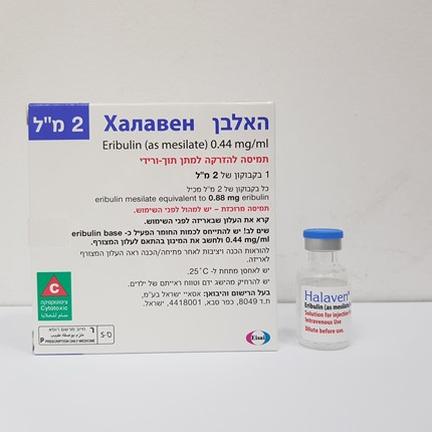Quest for the right Drug

האלבן HALAVEN (ERIBULIN AS MESILATE)
תרופה במרשם
תרופה בסל
נרקוטיקה
ציטוטוקסיקה
צורת מתן:
תוך-ורידי : I.V
צורת מינון:
תמיסה להזרקה : SOLUTION FOR INJECTION
עלון לרופא
מינוניםPosology התוויות
Indications תופעות לוואי
Adverse reactions התוויות נגד
Contraindications אינטראקציות
Interactions מינון יתר
Overdose הריון/הנקה
Pregnancy & Lactation אוכלוסיות מיוחדות
Special populations תכונות פרמקולוגיות
Pharmacological properties מידע רוקחי
Pharmaceutical particulars אזהרת שימוש
Special Warning עלון לרופא
Physicians Leaflet
Special Warning : אזהרת שימוש
4.4 Special warnings and precautions for use Haematology Myelosuppression is dose dependent and primarily manifested as neutropenia (section 4.8). Monitoring of complete blood counts should be performed on all patients prior to each dose of eribulin. Treatment with eribulin should only be initiated in patients with ANC values ≥ 1.5 x 109/l and platelets > 100 x 109/l. Febrile neutropenia occurred in < 5% of patients treated with eribulin. Patients experiencing febrile neutropenia, severe neutropenia or thrombocytopenia, should be treated according to the recommendations in section 4.2. Patients with alanine aminotransferase (ALT) or aspartate aminotransferase (AST) >3 x upper limit of normal (ULN) experienced a higher incidence of Grade 4 neutropenia and febrile neutropenia. Although data are limited, patients with bilirubin >1.5 x ULN also have a higher incidence of Grade 4 neutropenia and febrile neutropenia. Fatal cases of febrile neutropenia, neutropenic sepsis, sepsis and septic shock have been reported. Severe neutropenia may be managed by the use of granulocyte colony-stimulating factor (G-CSF) or equivalent at the physician’s discretion in accordance with relevant guidelines (see section 5.1). Peripheral neuropathy Patients should be closely monitored for signs of peripheral motor and sensory neuropathy. The development of severe peripheral neurotoxicity requires a delay or reduction of dose (see section 4.2) In clinical trials, patients with pre-existing neuropathy greater than Grade 2 were excluded. However, patients with pre-existing neuropathy Grade 1 or 2 were no more likely to develop new or worsening symptoms than those who entered the study without the condition. QT prolongation In an uncontrolled open-label ECG study in 26 patients, QT prolongation was observed on Day 8, independent of eribulin concentration, with no QT prolongation observed on Day 1. ECG monitoring is recommended if therapy is initiated in patients with congestive heart failure, bradyarrhythmias or concomitant treatment with medicinal products known to prolong the QT interval, including Class Ia and III antiarrhythmics, and electrolyte abnormalities. Hypokalaemia, hypocalcaemia or hypomagnesaemia should be corrected prior to initiating HALAVEN and these electrolytes should be monitored periodically during therapy. Eribulin should be avoided in patients with congenital long QT syndrome. Excipients This medicinal product contains small amounts of ethanol (alcohol), less than 100 mg per dose.
Effects on Driving
4.7 Effects on ability to drive and use machines HALAVEN may cause adverse reactions such as tiredness and dizziness which may lead to minor or moderate influence on the ability to drive or use machines. Patients should be advised not to drive or use machines if they feel tired or dizzy.

פרטי מסגרת הכללה בסל
א. התרופה תינתן לטיפול במקרים האלה:1. סרטן שד מתקדם מקומי או גרורתי מסוג TNBC (triple negative breast cancer) בחולה שמחלתו התקדמה לאחר קו טיפול כימותרפי קודם למחלתו המתקדמת.2. ליפוסרקומה לא נתיחה בחולה בגיר שקיבל טיפול קודם שכלל תרופה ממשפחת האנתראציקלינים למחלתו המתקדמת או הגרורתית.ב. מתן התרופה האמורה ייעשה לפי מרשם של מומחה באונקולוגיה.
שימוש לפי פנקס קופ''ח כללית 1994
לא צוין
תאריך הכללה מקורי בסל
21/01/2016
הגבלות
תרופה מוגבלת לרישום ע'י רופא מומחה או הגבלה אחרת
מידע נוסף
